This excerpt from History Through the Headsets: Inside Notre Dame’s Playoff Run During the Craziest Season in College Football History by John Mahoney and Reed Gregory is reprinted with the permission of Triumph Books. For more information and to order a copy, please visit Amazon, Barnes & Noble, Bookshop.org, or TriumphBooks.com.
History Through the Headsets by John Mahoney and Reed Gregory – Excerpt from Chapter 7
As the final seconds of their 31–13 victory over Georgia Tech ticked away at Bobby Dodd Stadium, an unmistakable sense of anticipation fell over the Fighting Irish. Earlier that day, the Trevor Lawrence–less Clemson Tigers had survived a formidable challenge from Boston College, setting up a matchup of undefeateds to be held at Notre Dame Stadium the following Saturday.
In the locker room after the game, Coach Kelly was characteristically blunt about both the team’s performance and the challenges the team would face moving forward. Though they’d done a lot of good things against the Yellow Jackets that day, the Irish knew they would need to sharpen up substantially prior to the following Saturday’s game. No longer would there be such a disparity in talent that minor errors in discipline or execution could simply be glossed over. For the first time this season, Notre Dame would face a team just as—if not more—talented than they were. Not only that, but this was the biggest game to be held on campus in over a decade, and—at least for the week ahead—the center of the college football universe would be in South Bend. ESPN’s College GameDay would be in town, and kickoff was set for 7:30 pm on NBC—with Mike Tirico and Tony Dungy on the call. The stage was set, and any pretense of this week’s matchup being “just another game” fell quickly by the wayside.
REED: Never has a win felt so much like a loss. We knew the challenges the next weekend would hold and understood that that day’s performance would not be enough to get the job done. Stern faces replaced the typical post-win cheer. The upcoming game was our shot to prove that we belonged and silence the hate that followed our 2018 Clemson loss. Looking around the room, I knew no one would take this game for granted.
JOHN: Since Pittsburgh week, Coach Kelly’s message had been consistent. No longer could we afford to merely focus on the team immediately in front of us—each week we needed to grow and improve to be able to meet the goals we would face later in the season. Admittedly, after such a close victory over Louisville, I was skeptical about this approach. Since the moment I began playing sports, I’d always been taught that the next game was the most important one, and that looking too far ahead was a recipe for disaster. However, as we left the locker room and headed to the airport, his approach made more sense. It was a risky move, no doubt, but it was the only way to get the team prepared for such a big game. Things like that are why he’s so good at what he does—and why he’s had the success he’s had everywhere he’s been.
Further complicating matters was the presidential election, to be held on Tuesday, November 3. And though Election Day always marks an inflection point in American society, this year was different— even in the world of college athletics. In response to popular demand, the NCAA mandated that no teams were to hold practice on Election Day so that student-athletes could exercise their civic duty. Practically, this meant that both Clemson and Notre Dame would need to adjust their preparation schedules during an already chaotic week—no small task given the circumstances and gravity of this particular matchup. In South Bend, this manifested itself in the form of Sunday meetings and workouts—much to the chagrin of coaches, players, and support staff eager for a chance to rest and recover after two consecutive road games.
JOHN: Though I commend the NCAA for their support of civic participation, I felt like this was yet another well-intentioned effort that practically made little sense. Our staff had done a tremendous job of getting the entire team registered to vote, and the vast majority of us had voted by absentee ballot prior to Election Day. We went out of our way to take care of it ahead of time, and yet we still felt like we were at a disadvantage.
For the Irish, Mondays (or Sunday, in this instance) are used for review of the previous game, as well as the scouting report for the following week’s game. Corrections are made, congratulations and criticisms are given, and the book is closed on the previous
week. By the end of the day, the focus is completely on the following week’s opponent. Defensively, the focus was squarely on Clemson’s freshman quarterback, D.J. Uiagalelei—who, in his first collegiate start, had completed nearly 75 percent of his passes while throwing for 342 yards and two touchdowns. He may not have been Trevor Lawrence, but the Irish defense quickly realized they would have to deal with him just the same.
REED: I had mixed feelings when I first learned of Lawrence’s positive COVID test. I knew it might give us a better chance of winning, but I also wanted to play the best. That being said, adjusting to COVID and limiting the spread was a new aspect of the season. Players had to be undoubtedly COVID-free to be allowed to strap on the pads. Our team doctors Matt Leiszler and Rob Hunt, did a fantastic job adapting to these unchartered waters and keeping the team safe. There is something to be said for keeping COVID out of our facilities…especially around big games.
JOHN: I actually remember where I was when I first learned of Trevor Lawrence’s positive COVID test. I was out to eat at the Lauber in South Bend, and when I saw the news on the TV behind the bar, I couldn’t believe my eyes. I think my reaction might have offended the company I was with, but you couldn’t help but think about the implications of something like that. Having recently been quarantined myself, I did the math and soon realized he wouldn’t be able to play against us. I thought it was a big deal at the time, but after seeing D.J. play against BC, I quickly realized that there wouldn’t be much of a drop-off.
Joining Lawrence on the injured/sick list, however, were a number of the Tigers’ best players on the defensive side of the ball. Middle linebacker James Skalski—the unquestioned leader of the Clemson defense—had missed the two previous games with a groin injury, while defensive tackle Tyler Davis and linebacker Mike Jones Jr. were also ruled out. Additionally, defensive end Xavier Thomas would be unable to play in the first half due to his ejection for targeting in the prior week’s contest. Though Lawrence’s absence received the most attention, those in the know at both programs realized the potential impact of these holes in the Tigers defense. Even for a team as deep as Clemson, the loss of three all-conference performers on one side of the ball is extremely challenging to overcome. Though the talent behind these players was certainly worthy of respect, the Notre Dame offense sensed an opportunity.
REED: Outside of teaching the intricate details of his defense, Coach Lea always made a point to incorporate a life lesson into his meetings. This week’s lesson had some not-so-subtle implications. Lea told a story he had heard from a friend who coached Aaron Donald, three-time NFL defensive player of the year, at Pitt. After one of Pitt’s road losses, the team would fly home late at night. Upon arrival, most of the team quickly dropped their things off at the facilities and went home to sleep. Aaron Donald did not. He would go directly from the bus to the film room, watch the entire game, and write everything he did wrong on the whiteboard. When the coach came in the next morning, the whiteboards would be filled with notes, questions, and comments on his play. What Coach Lea was really saying was that he wanted to see the linebackers in the film room outside of our regular schedule. If there was any week to channel your inner Aaron Donald, it was this week.
JOHN: I was on the scout team that week, and I thought the offensive game plan did a fantastic job of isolating our relative strengths and their relative weaknesses—particularly given the circumstances. Obviously, our offensive line had done a tremendous job to that point, and their losses in the front seven left them shorthanded. I can remember talking it over early in the week with Gus Ragland, the graduate assistant who led the defensive scout team, and being both impressed and excited for what was to come. If we could establish the run game and give Ian the chance to get outside the pocket and extend plays, it wasn’t difficult to see things going well for us offensively.
Following Monday’s practice, the Irish found themselves with some spare time, as Election Day provided them with the aforementioned day off from team activities. For a group so used to maintaining a strict routine, this presented a significant disruption— and for the less politically inclined members of the team, perhaps afforded them some time to tune into the national conversation surrounding Saturday’s game. Some in the media, aware of Clemson’s injury situation and already looking ahead to an ACC Championship Game a month-and-a-half later, began discussing the idea that Saturday’s game wouldn’t ultimately matter as the playoff picture ultimately defined itself. On ESPN’s First Take, college football pundit extraordinaire Paul Finebaum discussed ad nauseam the path the Tigers would need to take, presumably following a loss, to still make the playoff—suggesting that Lawrence’s absence would totally change the perception of the game in the eyes of the selection committee. Furthermore, it seemed that he wasn’t alone in believing that. Predictably, this didn’t sit well in South Bend.
REED: I understand the reasoning behind these conversations, but nothing positive came from them. Neither side benefited from hearing that this game carried less meaning. To me, it seemed like the media was causing an unnecessary disturbance to create drama around what was a phenomenal matchup between two of college football’s greatest powerhouses.
JOHN: I can remember turning the TV on to hear a discussion about exactly this. It’s frustrating as a player, because something like this was completely beyond our control. As much as you try to block stuff out, I’d be lying if I said this perception wasn’t something that certainly got discussed in meetings that week. More motivation, I suppose, but I still think it was disrespectful to both teams to be pushing that narrative before the game was even played.
Following the day off, however, the week continued on surprisingly smoothly. As Grit Wednesday turned to Attention to Detail Thursday, the team grew increasingly comfortable with the plan. Thursday practice was held in Notre Dame Stadium—as is customary before home games—giving the Irish a chance to envision what was to come the following Saturday. Practice was crisp and detailed, and it appeared that the team had gotten through the week more or less healthy. Friday’s walk-through was similarly uneventful, which was a good sign given all the chaos that the year had brought so far.
However, in team Mass that Friday afternoon, team chaplain Father Nate Wills gave the team medals that featured Stella Maris—Latin for “Star of the Sea.” This gift by itself wasn’t anything particularly unusual, since the team receives a medal prior to every game, but this was different. Just once a year is Mary, Our Lady—the namesake of the university, of course—depicted on the medal. Not only was this the game where she was featured, but she was presented like the North Star—“shining proudly in the heavens.” It seemed almost too perfect, given the circumstances, and it would have been hard to find a man in that locker room who didn’t feel particularly inspired that day.
As the sun rose over South Bend on November 7, the energy on campus was undeniable. It was an unseasonably warm, sunny day—one that you’d expect in late September, rather than early November—which promised a pleasant playing and viewing experience but dispelled any hopes of a weather-related home-field advantage for the Irish. As some of the players gathered in the players’ lounge prior to that morning’s shake-out, they—along with the millions of other Americans tuned into GameDay that morning—were informed by Rece Davis, from inside Notre Dame Stadium just a stone’s throw away, that former Vice President Joe Biden had been officially declared the winner of Tuesday’s presidential election. On a day that was supposed to be all about football, it was a strange juxtaposition—but politics aside, it added a gravitas to the day’s events beyond what already existed.
Following the shake-out, the travel squad returned to the hotel. After a short rest, the team gathered in the Century Center’s amphitheater room across the street. Quiet and focused, they patiently waited for Coach Kelly to begin his speech. The players sat with their masks up, spread out with three to four seats between them. With the players focusing intently on Kelly, he took the floor and paced confidently as he addressed his team. He began by commenting on the numerous texts he had received leading up to the game—most of which were well-wishes, focused generally around the theme of “good luck.” However, he singled out a text from former Notre Dame wide receiver Chris Finke, who texted saying that he would wish the team good luck, but luck is for the unprepared. Coach Kelly focused on the underlying message of Chris’s text. He acknowledged that the team was indeed prepared and didn’t need luck. All we needed to do was show Clemson our preparation. “Welcome to our preparation!” he shouted. Eager grins overtook the players’ intense facades. They were ready, and they knew it. A confident group of Fighting Irish loaded up the buses and headed to the stadium. The time for preparation was over. Performance was all that was left.
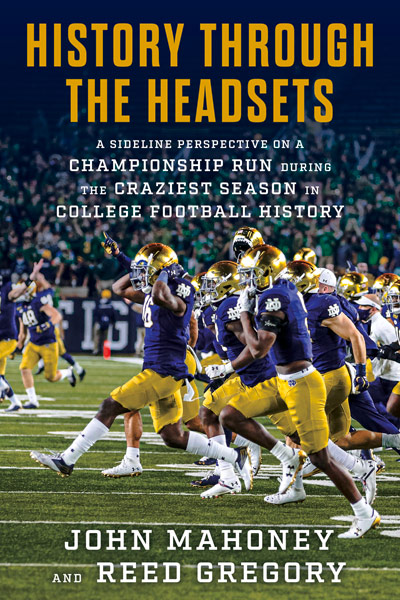
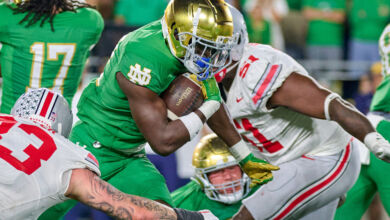
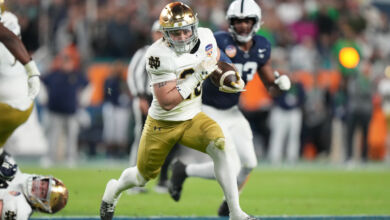
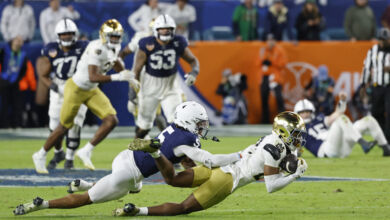
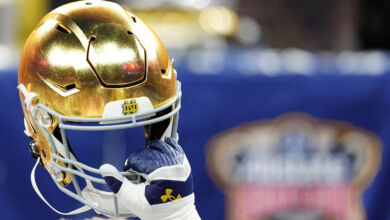
The authors actually create a feeling for the reads that we are actually there living the experiences with them.
It’s a special talent that can accomplish that level of realism.
Both authors are now off on their careers in finace and elite corporate consulting. But, there again, that’s what a Notre Dame degree does fo their athletes as promise when they’re recruited. Most don’t make it to the NFL. Thus, the ND degree is the backup insurance for a prosperous life. Something few other power 5 colleges can offer.
Schools like ND, Stanford, Boston College and Northwestern recruit academically sound athletes, which diminishes the choices, which makes their success even more impressive. Other schools might produce a handful of high achievers, ND requires their entire squad to be high achievers.
Dopey Dave, you are obsessed with a team and coach you hate, go post on YOUR team if you have one!!!
LGB!!!
While you certainly are a real credit to the site.
As a fan I’d like to see them win all their games and hopefully make the playoffs. The avg margin of victory in the semi finals is essentially 3 TDs so it’s not like the games are typically very competitive no matter who plays.
Fan? Is that what you tell yourself between ‘episodes’ ?
I for one would rather see ND go 11-2 by winning a second-tier bowl game, than for it end up at 11-2 by making the playoff and getting massacred again.
And that’s what would happen, so don’t kid yourself.
ND is simply not in that group, and they are several other teams that would at least make interesting obstacles for the favorites.
The authors actually create a feeling for the reads that we are actually there living the experiences with them.
It’s a special talent that can accomplish that level of realism.
Both authors are now off on their careers in finace and elite corporate consulting. But, there again, that’s what a Notre Dame degree does fo their athletes as promise when they’re recruited. Most don’t make it to the NFL. Thus, the ND degree is the backup insurance for a prosperous life. Something few other power 5 colleges can offer.
Schools like ND, Stanford, Boston College and Northwestern recruit academically sound athletes, which diminishes the choices, which makes their success even more impressive. Other schools might produce a handful of high achievers, ND requires their entire squad to be high achievers.